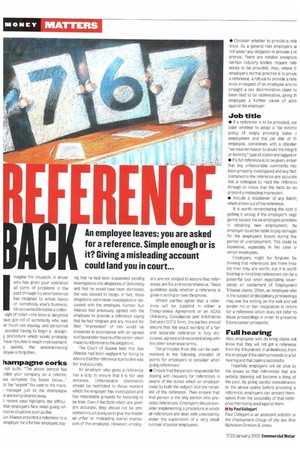An employee leaves; you are asked for a reference. Simple
Page 40

If you've noticed an error in this article please click here to report it so we can fix it.
enough or is it? Giving a misleading account could land you in court...
Imagine the situation. A driver who has given your operation all sorts of problems in the past through his incompetence has resigned to wreak havoc on somebody else's business. All concerned breathe a collec
• sigh of relief—the boss is delighted lave got rid of somebody who was er much use anyway, and personnel avoided having to begin a discipliy procedure which would probably have resulted in much improvement. y quickly, the underachieving )loyee is forgotten.
harnpagne corks
not quite. "The above person has vided your company as a referee. Ise complete the boxes below..." is the "urgent" fax sent to the transmanager just as the champagne (s are being cleared away k recent case highlights the difficulthat employers face when giving refices in situations such as this.
>un Alliance provided a reference to a employer for a former employee, say ing that he had been suspended pending investigations into allegations of dishonesty and that he would have been dismissed, but was allowed to resign. In fact, those allegations were never investigated or discussed with the employee. Further, Sun Alliance had previously agreed with the employee to provide a reference saying that he had resigned and any request for their "impression" of him would be answered in accordance with an agreed and favourable resume of his career which made no reference to the allegations.
The Court of Appeal held that Sun Alliance had been negligent for failing to ensure that the reference it provided was fair and accurate.
An employer who gives a reference has a duty to ensure that it is fair and accurate. Unfavourable statements should be restricted to those matters which the employer has investigated and has reasonable grounds for believing to be true. Even if the facts which are given are accurate, they should not be presented in such a way as to give the reader an unfair or misleading overall impression of the employee. However, employ
ers are not obliged to ensure that references are full and comprehensive. These guidelines apply whether a reference is given in writing or over the phone.
Where parties agree that a reference will be supplied in either a Compromise Agreement or an ACAS (Advisory, Conciliation and Arbitration Service) COT3 form, the parties should ensure that the exact wording of a fair and accurate reference is fully discussed, agreed and recorded along with the other severance terms.
The principles from this can be summarised in the following checklist of points for employers to consider when giving references: • Ensure that the person responsible for dealing with requests for references is aware of the duties which an employer owes to both the subject and the recipient of the reference. Then ensure that that person is the only person who provides references. Employers should consider implementing a procedure in which all references are dealt with consistently under the supervision of a very small number of senior employees.
• Consider whether to provide a refe ence. As a general rule employers at not under any obligation to provide a re erence. There are notable exception certain industry bodies require refe ences to be provided. Also, where tiemployer's normal practice is to provic a reference, a refusal to provide a refe ence in respect of an employee who he brought a sex discrimination claim he been held to be victimisation, giving th employee a further cause of actic against the employer.
Job title
• II a reference is to be provided, cor sider whether to adopt a "de minimis policy of simply providing dates c employment and the job title of th employee, sometimes with a standar "we have no reason to doubt the integrit or honesty" type of statement tagged or • If a full reference is to be given. ensun that any unfavourable comments havi been properly investigated and any fact: contained in the reference are accurate Ask a colleague to read the referenci through to check that the facts do no present a misleading impression.
• Include a disclaimer of any liabilih which arises out of the reference.
It is worth remembering the cost o getting it wrong: if the employer's negi gence causes the ex-employee problem: in obtaining new employment, thE employer could be liable to pay damageE for the employee's losses during the period of unemployment. This could bE expensive, especially in the case o' senior employees.
Employers might be forgiven for thinking that references are more trouble than they are worth, but it is worth bearing in mind that references can be a powerful tool when negotiating severances or settlement of Employment Tribunal claims. Often, an employee who is the subject of disciplinary proceedings may see the writing on the wall and will tender his or her resignation in return for a reference which does not refer to those proceedings in order to preserve future career prospects.
Full hearing
Also, employees who do bring claims will know that they will not get a reference from the Tribunal nor, in all likelihood, from the employer if the claim proceeds to a full hearing and that claim is successful.
Hopefully employers will be alive to the issues so that references that are unfairly damning will become a thing of the past. By giving careful consideration to the above points before providing a reference, employers can protect themselves from the possibility of that reference then being used against them.
• by Paul Callegari
Paul Callegari is an assistant solicitor in the Employment Group of city law firm Nicholson Graham & Jones,








































































































































